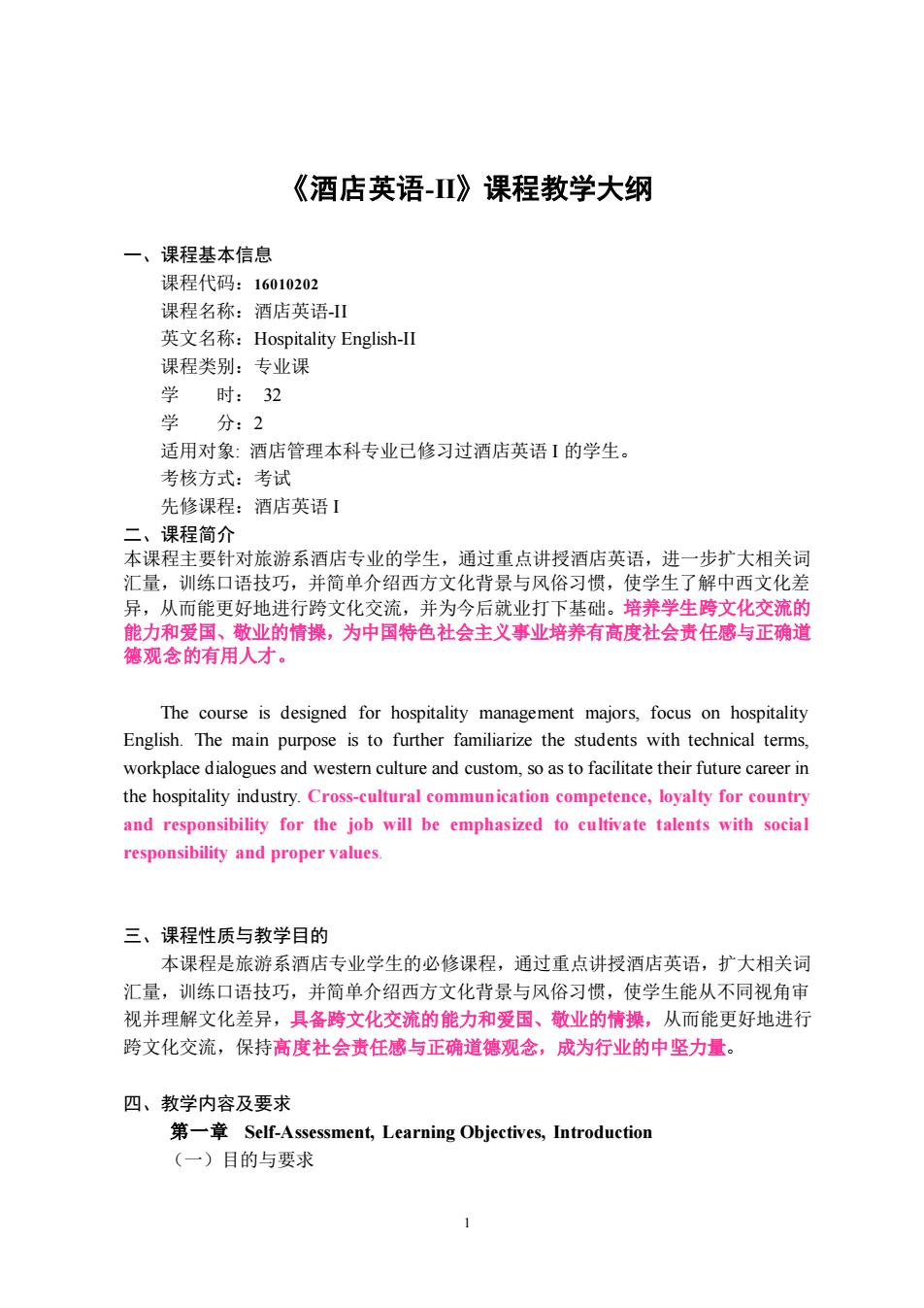
《酒店英语-Ⅱ》课程教学大纲 一、课程基本信息 课程代码:16010202 课程名称:酒店英语 英文名称:Hospitality English-I 课程类别:专业课 学 时:32 学 分:2 适用对象:酒店管理本科专业已修习过酒店英语I的学生 老核方式:考试 先修课程:酒店英语】 二、课程简介 本课程主要针对旅游系酒店专业的学生,通过重点讲授酒店英语,进一步扩大相关词 汇量,训练口语技巧,并简单介绍西方文化背景与风俗习惯,使学生了解中西文化差 异,从而能更好地进行跨文化交流,并为今后就业打下基础。培养学生跨文化交流的 能力和爱国、敬业的情操,为中国特色社会主义事业培养有高度社会责任感与正确道 德观念的有用人才。 The course is designed for hospitality management majors,focus on hospitality English.The main purpose is to further familiarize the students with technical terms. workplace dialogues and western culture and custom.so as to facilitate their future career in the hospitality industry.Cross-cultural communication competence,loyalty for country and responsibility for the job will be emphasized to cultivate talents with social responsibility and proper values. 三、课程性质与教学目的 本课程是旅游系酒店专业学生的必修课程,通过重点讲授酒店英语,扩大相关词 汇量,训练口语技巧,并简单介绍西方文化背景与风俗习惯,使学生能从不同视角审 视并理解文化差异,具备跨文化交流的能力和爱国、散业的情操,从而能更好地进行 跨文化交流,保持高度社会责任感与正确道德观念,成为行业的中坚力量。 四、教学内容及要求 第一章Self-Assessment,Learning Objectives,Introduction (一)目的与要求
1 《酒店英语-II》课程教学大纲 一、课程基本信息 课程代码:16010202 课程名称:酒店英语-II 英文名称:Hospitality English-II 课程类别:专业课 学 时: 32 学 分:2 适用对象: 酒店管理本科专业已修习过酒店英语 I 的学生。 考核方式:考试 先修课程:酒店英语 I 二、课程简介 本课程主要针对旅游系酒店专业的学生,通过重点讲授酒店英语,进一步扩大相关词 汇量,训练口语技巧,并简单介绍西方文化背景与风俗习惯,使学生了解中西文化差 异,从而能更好地进行跨文化交流,并为今后就业打下基础。培养学生跨文化交流的 能力和爱国、敬业的情操,为中国特色社会主义事业培养有高度社会责任感与正确道 德观念的有用人才。 The course is designed for hospitality management majors, focus on hospitality English. The main purpose is to further familiarize the students with technical terms, workplace dialogues and western culture and custom, so as to facilitate their future career in the hospitality industry. Cross-cultural communication competence, loyalty for country and responsibility for the job will be emphasized to cultivate talents with social responsibility and proper values. 三、课程性质与教学目的 本课程是旅游系酒店专业学生的必修课程,通过重点讲授酒店英语,扩大相关词 汇量,训练口语技巧,并简单介绍西方文化背景与风俗习惯,使学生能从不同视角审 视并理解文化差异,具备跨文化交流的能力和爱国、敬业的情操,从而能更好地进行 跨文化交流,保持高度社会责任感与正确道德观念,成为行业的中坚力量。 四、教学内容及要求 第一章 Self-Assessment, Learning Objectives, Introduction (一)目的与要求
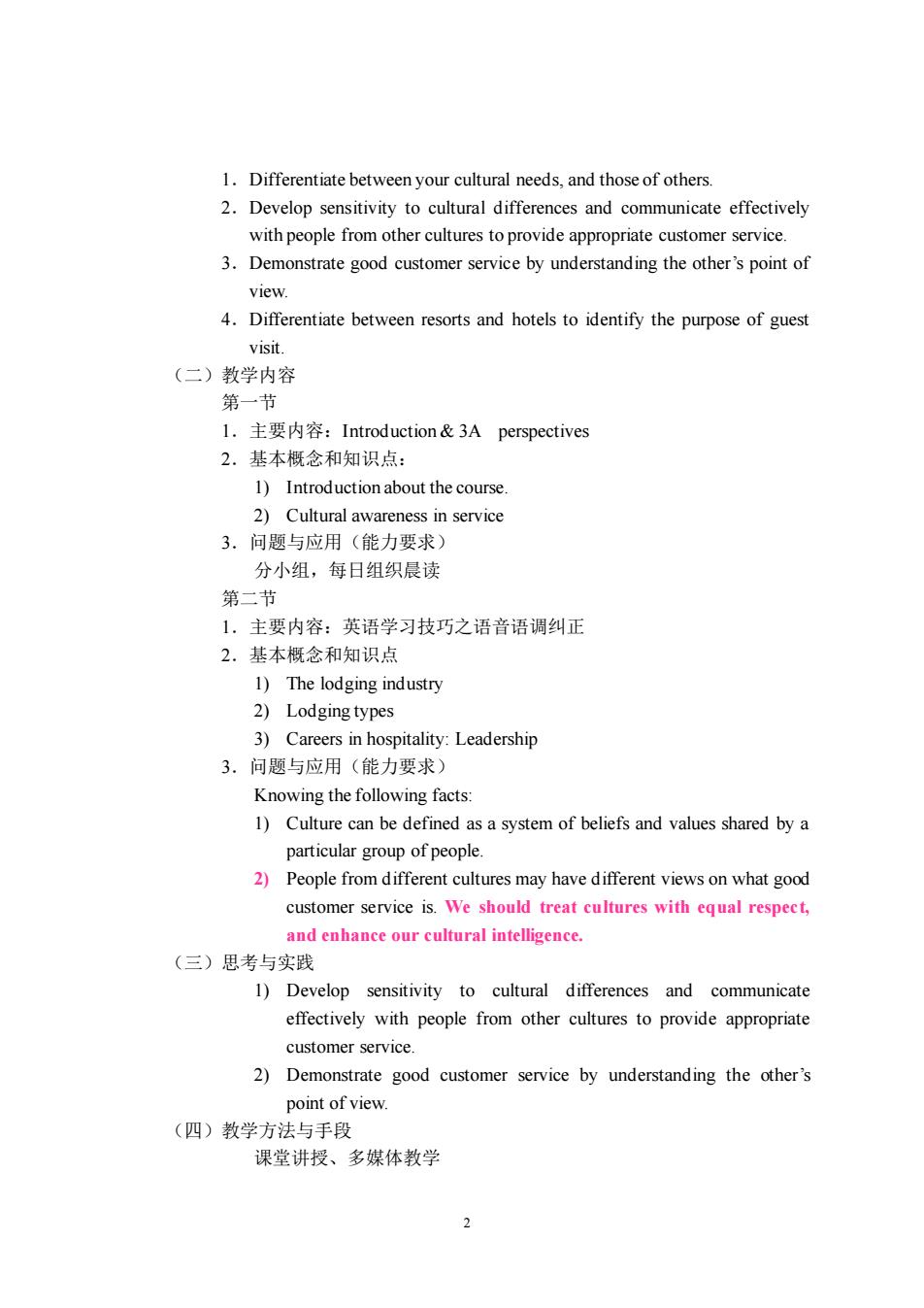
1.Differentiate between your cultural needs,and those of others. 2.Develop sensitivity to cultural differences and communicate effectively with people from other cultures to provide appropriate customer service. 3.Demonstrate good customer service by understanding the other's point of view 4.Differentiate between resorts and hotels to identify the purpose of guest visit (二)教学内容 第一节 I.主要内容:Introduction&3 A perspectives 2.基本概念和知识点: 1)Introduction about the course. 2)Cultural awareness in service 3.问题与应用(能力要求) 分小组,每日组织晨读 第二节 1.主要内容:英语学习技巧之语音语调纠正 2.基本概念和知识点 1)The lodging industry 2)Lodging types 3)Careers in hospitality:Leadership 3.问题与应用(能力要求) Knowing the following facts: 1)Culture can be defined as a system of beliefs and values shared by a particular group of people. 2)People from different cultures may have different views on what good customer service is.We should treat cultures with equal respect, and enhance our cultural intelligence. (三)思考与实践 1)Develop sensitivity to cultural differences and communicate effectively with people from other cultures to provide appropriate customer service 2)Demonstrate good customer service by understanding the other's point of view (四)教学方法与手段 课堂讲授、多媒体教学 2
2 1.Differentiate between your cultural needs, and those of others. 2.Develop sensitivity to cultural differences and communicate effectively with people from other cultures to provide appropriate customer service. 3.Demonstrate good customer service by understanding the other’s point of view. 4.Differentiate between resorts and hotels to identify the purpose of guest visit. (二)教学内容 第一节 1.主要内容:Introduction & 3A perspectives 2.基本概念和知识点: 1) Introduction about the course. 2) Cultural awareness in service 3.问题与应用(能力要求) 分小组,每日组织晨读 第二节 1.主要内容:英语学习技巧之语音语调纠正 2.基本概念和知识点 1) The lodging industry 2) Lodging types 3) Careers in hospitality: Leadership 3.问题与应用(能力要求) Knowing the following facts: 1) Culture can be defined as a system of beliefs and values shared by a particular group of people. 2) People from different cultures may have different views on what good customer service is. We should treat cultures with equal respect, and enhance our cultural intelligence. (三)思考与实践 1) Develop sensitivity to cultural differences and communicate effectively with people from other cultures to provide appropriate customer service. 2) Demonstrate good customer service by understanding the other’s point of view. (四)教学方法与手段 课堂讲授、多媒体教学
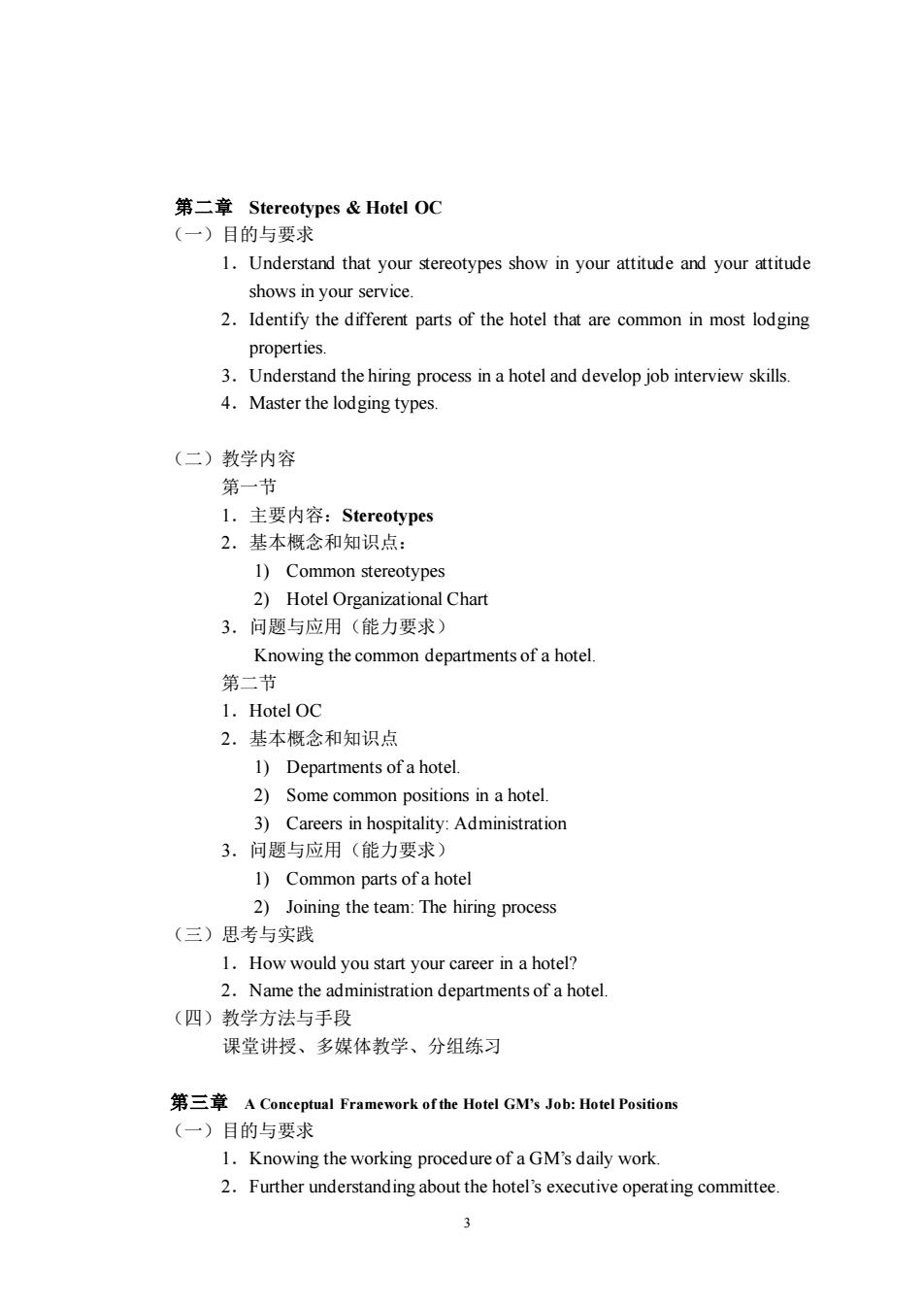
第二章Stereotypes&HotelO( (一)目的与要求 1.Understand that your stereotypes show in your attitude and your attitude shows in your service. 2.Identify the different parts of the hotel that are common in most lodging properties. 3.Understand the hiring process in a hotel and develop job interview skills. 4.Master the lodging types. (二)教学内容 第一节 l.主要内容:Stereotypes 2.基本概念和知识点: 1)Common stereotypes 2)Hotel Organizational Chart 3.问题与应用(能力要求) Knowing the common departments of a hotel. 第二节 1.Hotel OC 2.基本概念和知识点 1)Departments of a hotel. 2)Some common positions in a hotel 3)Careers in hospitality:Administration 3.问题与应用(能力要求) 1)Common parts ofa hotel 2)Joining the team:The hiring process (三)思考与实践 1.How would you start your career in a hotel? 2.Name the administration departments of a hotel. (四)教学方法与手段 课堂讲授、多媒体教学、分组练习 第三章A Conc tual Framework of the Hotel GM's Job:Hotel Positions (一)目的与要求 1.Knowing the working procedure of a GM's daily work 2.Further understanding about the hotel's executive operating committee. 3
3 第二章 Stereotypes & Hotel OC (一)目的与要求 1.Understand that your stereotypes show in your attitude and your attitude shows in your service. 2.Identify the different parts of the hotel that are common in most lodging properties. 3.Understand the hiring process in a hotel and develop job interview skills. 4.Master the lodging types. (二)教学内容 第一节 1.主要内容:Stereotypes 2.基本概念和知识点: 1) Common stereotypes 2) Hotel Organizational Chart 3.问题与应用(能力要求) Knowing the common departments of a hotel. 第二节 1.Hotel OC 2.基本概念和知识点 1) Departments of a hotel. 2) Some common positions in a hotel. 3) Careers in hospitality: Administration 3.问题与应用(能力要求) 1) Common parts of a hotel 2) Joining the team: The hiring process (三)思考与实践 1.How would you start your career in a hotel? 2.Name the administration departments of a hotel. (四)教学方法与手段 课堂讲授、多媒体教学、分组练习 第三章 A Conceptual Framework of the Hotel GM’s Job: Hotel Positions (一)目的与要求 1.Knowing the working procedure of a GM’s daily work. 2.Further understanding about the hotel’s executive operating committee
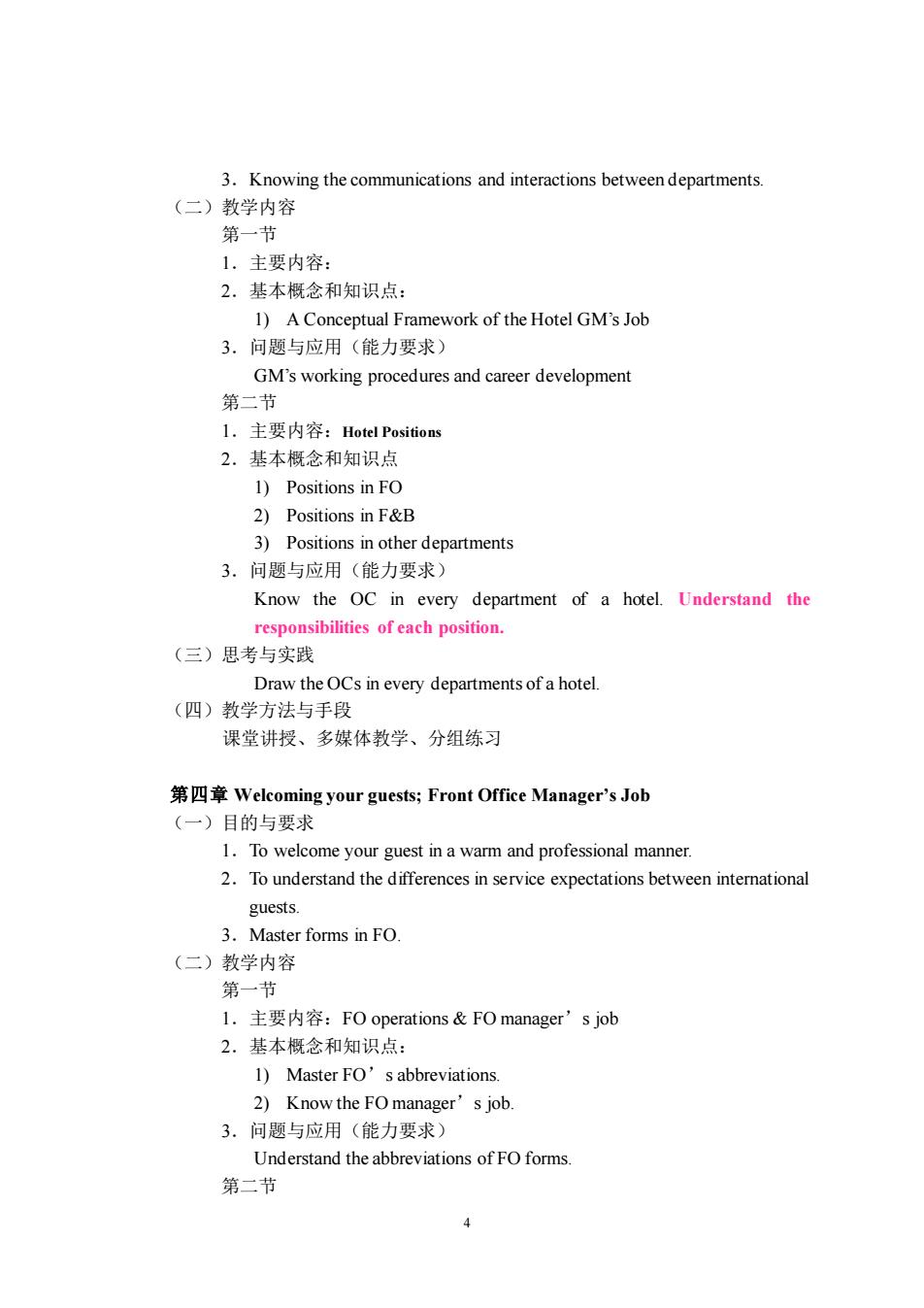
3.Knowing the communications and interactions between departments (二)教学内容 第一节 1.主要内容: 2.基本概念和知识点: 1)A Conceptual Framework of the Hotel GM's Job 3.问题与应用(能力要求) GM's working procedures and career development 第二 1.主要内容:Hotel Posi6 tions 2.基本概念和知识点 1)Positions in FO 2)Positions in F&B 3)Positions in other departments 3.问题与应用(能力要求) Know the OC in every department of a hotel.Understand the responsibilities of each position (三)思考与实践 Draw the OCs in every departments of a hote (四)教学方法与手段 课堂讲授、多媒体教学、分组练习 第四章Welcoming your guests;:Front Office Manager'sJob (一)目的与要求 1.To welcome your guest in a warm and professional manner. 2.To understand the differences in service expectations between intemational guests 3.Master forms in FO (二)教学内容 第一节 1.主要内容:F0 operations&F0 manager'sjob 2.基本概念和知识点: 1)Master FO's abbreviations. 2)Know the FO manager's job 3.问题与应用(能力要求) Understand the abbreviations of FO forms 第二节
4 3.Knowing the communications and interactions between departments. (二)教学内容 第一节 1.主要内容: 2.基本概念和知识点: 1) A Conceptual Framework of the Hotel GM’s Job 3.问题与应用(能力要求) GM’s working procedures and career development 第二节 1.主要内容:Hotel Positions 2.基本概念和知识点 1) Positions in FO 2) Positions in F&B 3) Positions in other departments 3.问题与应用(能力要求) Know the OC in every department of a hotel. Understand the responsibilities of each position. (三)思考与实践 Draw the OCs in every departments of a hotel. (四)教学方法与手段 课堂讲授、多媒体教学、分组练习 第四章 Welcoming your guests; Front Office Manager’s Job (一)目的与要求 1.To welcome your guest in a warm and professional manner. 2.To understand the differences in service expectations between international guests. 3.Master forms in FO. (二)教学内容 第一节 1.主要内容:FO operations & FO manager’s job 2.基本概念和知识点: 1) Master FO’s abbreviations. 2) Know the FO manager’s job. 3.问题与应用(能力要求) Understand the abbreviations of FO forms. 第二节
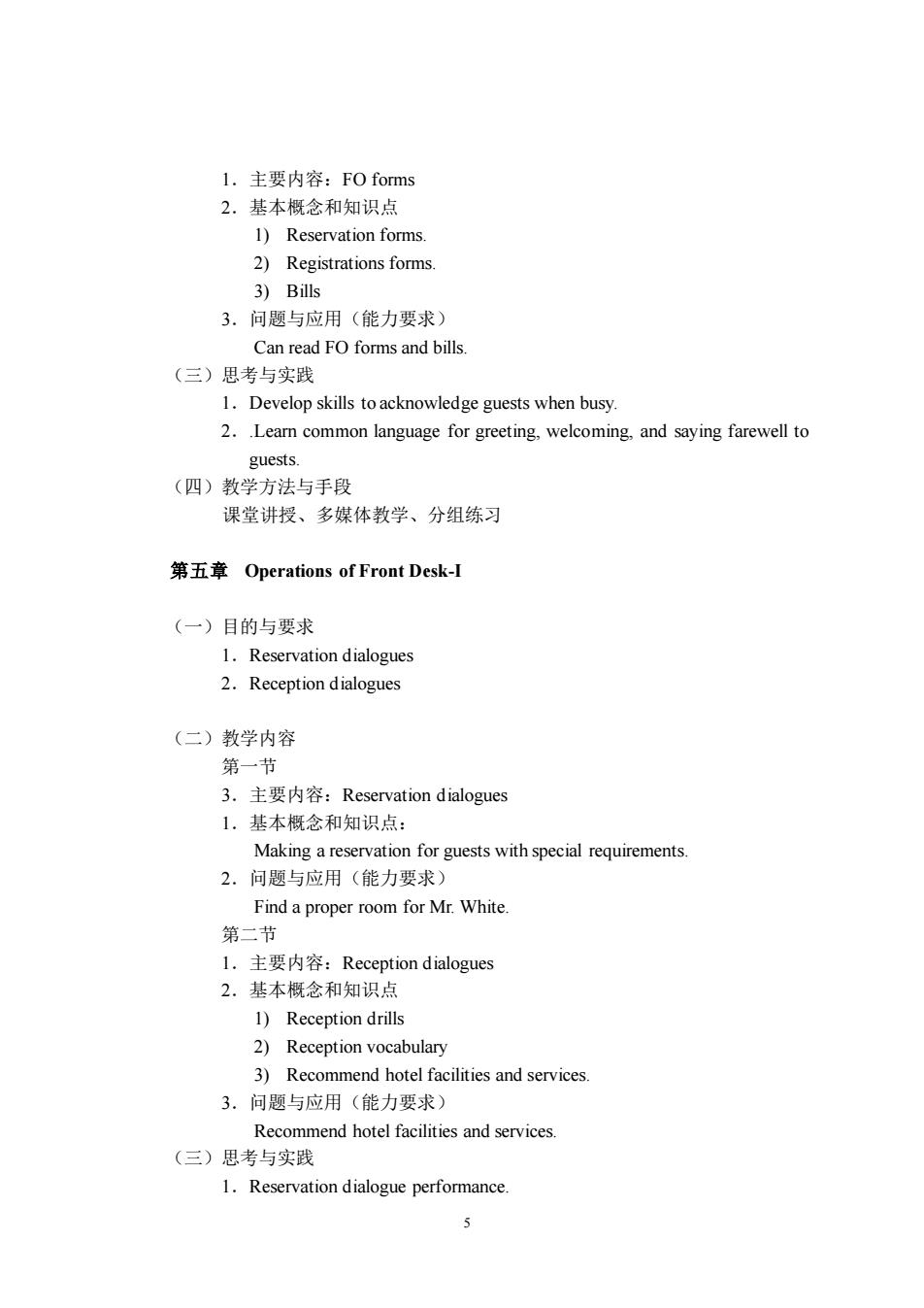
1.主要内容:FO forms 2.基本概念和知识点 1)Reservation forms. 2)Registrations forms 3)Bills 3.问题与应用(能力要求 Can read FO forms and bills (三)思考与实践 1.Develop skills to acknowledge guests when busy. 2..Learn common language for greeting,welcoming,and saying farewell to (四)教学方法与手段 课堂讲授、多媒体教学、分组练习 第五章Operations of Front Desk- (一)目的与要求 1.Reservation dialogues 2.Reception dialogues (二)教学内容 第一节 3.主要内容:Reservation dialogues 1.基本概念和知识点: Making a reservation for guests with special requirements 2.问题与应用(能力要求) Find a proper room for Mr.White 第二节 1.主要内容:Reception dialogues 2.基本概念和知识点 1)Reception drills 2)Reception vocabulary 3)Recommend hotel facilities and services 3.问题与应用(能力要求) Recommend hotel facilities and services (三)思考与实践 1.Reservation dialogue performance. 5
5 1.主要内容:FO forms 2.基本概念和知识点 1) Reservation forms. 2) Registrations forms. 3) Bills 3.问题与应用(能力要求) Can read FO forms and bills. (三)思考与实践 1.Develop skills to acknowledge guests when busy. 2..Learn common language for greeting, welcoming, and saying farewell to guests. (四)教学方法与手段 课堂讲授、多媒体教学、分组练习 第五章 Operations of Front Desk-I (一)目的与要求 1.Reservation dialogues 2.Reception dialogues (二)教学内容 第一节 3.主要内容:Reservation dialogues 1.基本概念和知识点: Making a reservation for guests with special requirements. 2.问题与应用(能力要求) Find a proper room for Mr. White. 第二节 1.主要内容:Reception dialogues 2.基本概念和知识点 1) Reception drills 2) Reception vocabulary 3) Recommend hotel facilities and services. 3.问题与应用(能力要求) Recommend hotel facilities and services. (三)思考与实践 1.Reservation dialogue performance
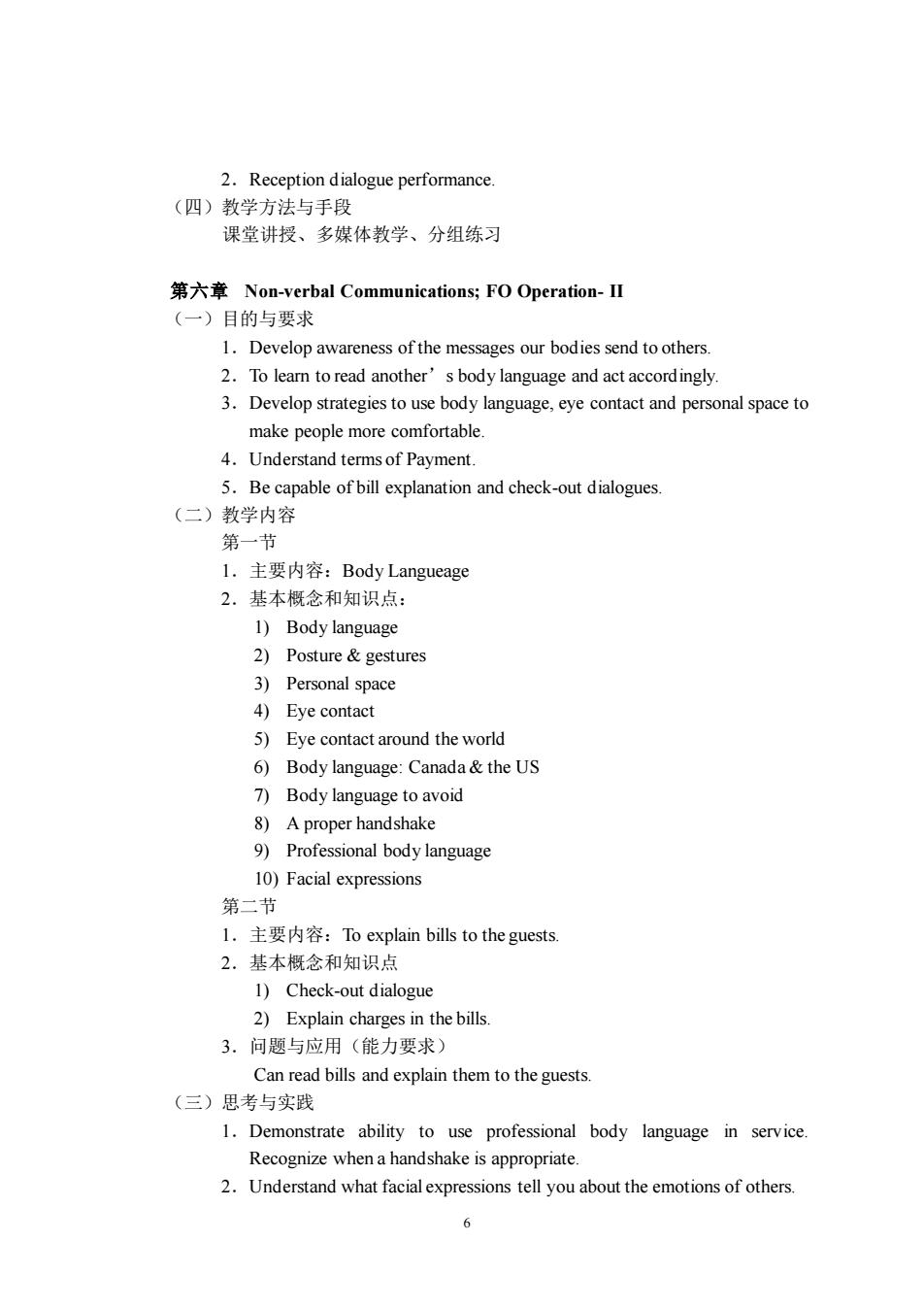
2.Reception dialogue performance (四)教学方法与手段 课堂讲授、多媒体教学、分组练习 第六章Non-verbal Communications:FO Operation-IⅡ (一)目的与要求 1.Develop awareness ofthe messages our bodies send to others 2.To leamn to read another's body language and act accordingly. 3.Develop strategies to use body language,eye contact and personal space to make people more comfortable 4.Understand termsof Payment 5.Be capable of bill explanation and check-out dialogues. (二)教学内容 第一节 l.主要内容:Body Langueage 2.基本概念和知识点: 1)Body language 2)Posture gestures 3)Personal space 4)Eve contact 5)Eye contact around the world 6)Body language:Canada&the US 7)Body language to avoid 8)A proper handshake 9)Professional body language 10)Facial expressions 第二节 .主要内容:To explain bills to the guests 2.基本概念和知识点 1)Check-out dialogue 2)Explain charges in the bills. 3.问题与应用(能力要求) Can read bills and explain them to the guests. (三)思考与实践 1.Demonstrate ability to use professional body language in service. Recognize when a handshake is appropriate 2.Understand what facial expressions tell you about the emotions of others. 6
6 2.Reception dialogue performance. (四)教学方法与手段 课堂讲授、多媒体教学、分组练习 第六章 Non-verbal Communications; FO Operation- II (一)目的与要求 1.Develop awareness of the messages our bodies send to others. 2.To learn to read another’s body language and act accordingly. 3.Develop strategies to use body language, eye contact and personal space to make people more comfortable. 4.Understand terms of Payment. 5.Be capable of bill explanation and check-out dialogues. (二)教学内容 第一节 1.主要内容:Body Langueage 2.基本概念和知识点: 1) Body language 2) Posture & gestures 3) Personal space 4) Eye contact 5) Eye contact around the world 6) Body language: Canada & the US 7) Body language to avoid 8) A proper handshake 9) Professional body language 10) Facial expressions 第二节 1.主要内容:To explain bills to the guests. 2.基本概念和知识点 1) Check-out dialogue 2) Explain charges in the bills. 3.问题与应用(能力要求) Can read bills and explain them to the guests. (三)思考与实践 1.Demonstrate ability to use professional body language in service. Recognize when a handshake is appropriate. 2.Understand what facial expressions tell you about the emotions of others
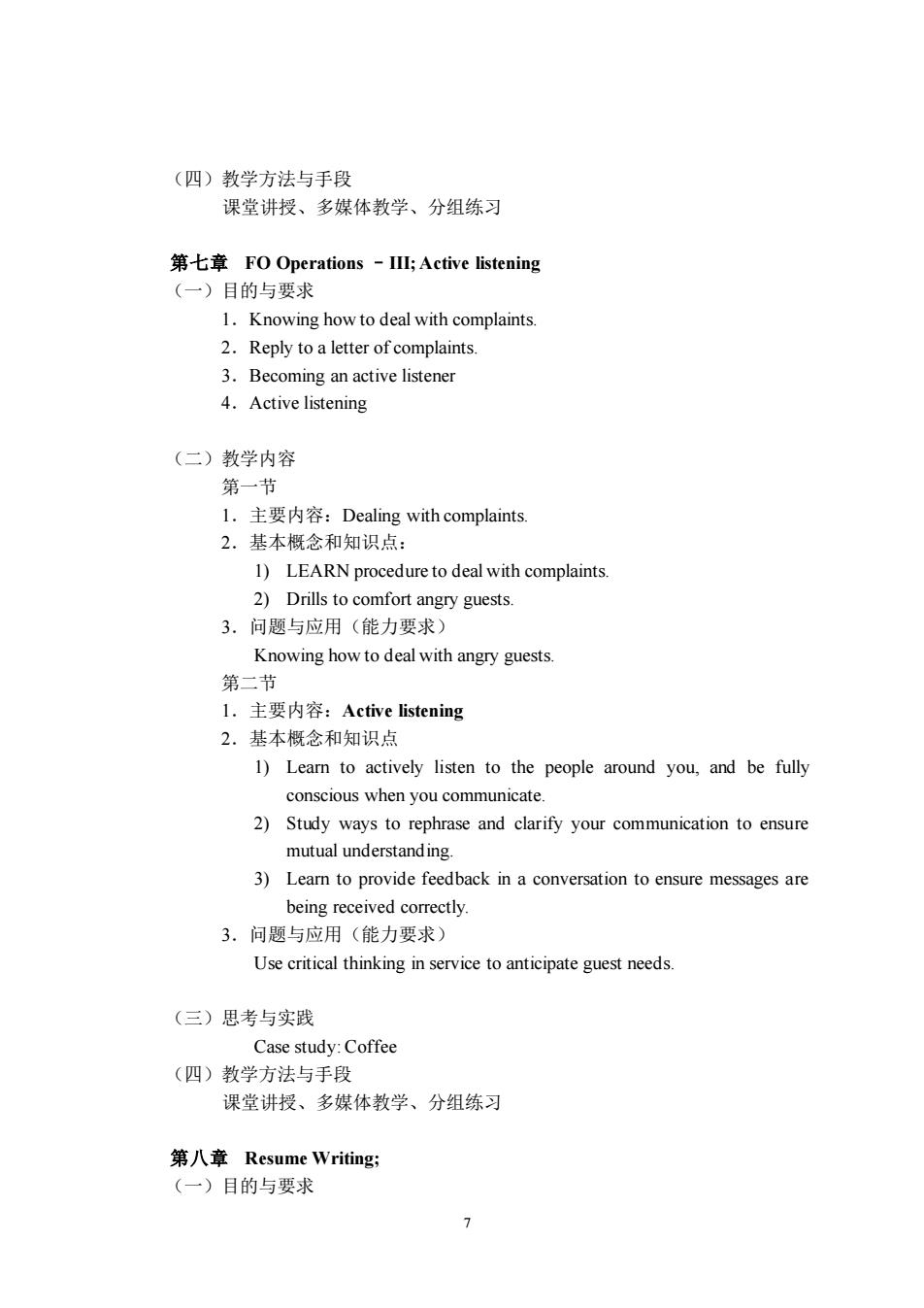
(四)教学方法与手段 课堂讲授、多媒体教学、分组练习 第七章FOOperations-亚;Active listening (一)目的与要求 1.Knowing how to deal with complaints 2.Reply to a letter of complaints. 3.Becoming an active listener 4.Active listening (二)教学内容 第一节 L.主要内容:Dealing with complaints 2.基本概念和知识点: 1)LEARN procedure to deal with complaints. 2)Drills to comfort angry guests. 3.问题与应用(能力要求) Knowing how to deal with angry guests. 第二节 l.主要内容:Active listening 2.基本概念和知识点 1)Leamn to actively listen to the people around you,and be fully conscious when you communicate 2)Study ways to rephrase and clarify your communication to ensure mutual understanding. 3)Learn to provide feedback in a conversation to ensure messages are being received correctly 3.问题与应用(能力要求) Use critical thinking in service to anticipate guest needs (三)思考与实践 Case study:Coffee (四)教学方法与手段 课堂讲授、多媒体教学、分组练习 第八章Resume Writing: (一)目的与要求 7
7 (四)教学方法与手段 课堂讲授、多媒体教学、分组练习 第七章 FO Operations –III; Active listening (一)目的与要求 1.Knowing how to deal with complaints. 2.Reply to a letter of complaints. 3.Becoming an active listener 4.Active listening (二)教学内容 第一节 1.主要内容:Dealing with complaints. 2.基本概念和知识点: 1) LEARN procedure to deal with complaints. 2) Drills to comfort angry guests. 3.问题与应用(能力要求) Knowing how to deal with angry guests. 第二节 1.主要内容:Active listening 2.基本概念和知识点 1) Learn to actively listen to the people around you, and be fully conscious when you communicate. 2) Study ways to rephrase and clarify your communication to ensure mutual understanding. 3) Learn to provide feedback in a conversation to ensure messages are being received correctly. 3.问题与应用(能力要求) Use critical thinking in service to anticipate guest needs. (三)思考与实践 Case study: Coffee (四)教学方法与手段 课堂讲授、多媒体教学、分组练习 第八章 Resume Writing; (一)目的与要求
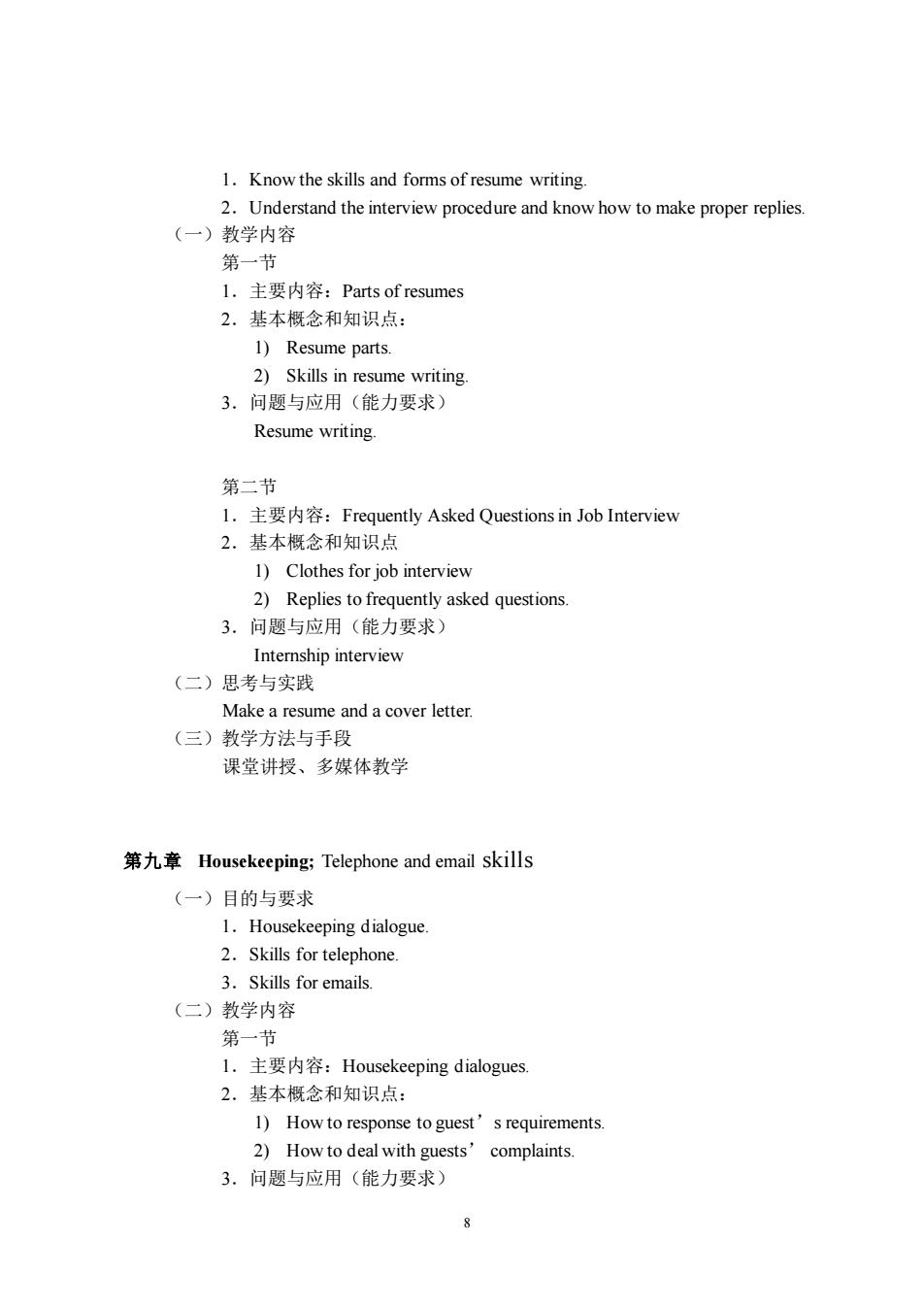
1.Know the skills and forms of resume writing. 2.Understand the interview procedure and know how to make proper replies (一)教学内容 第一节 l.主要内容:Parts of resumes 2.基本概念和知识点: l)Resume parts. 2)Skills in resume writing 3.问题与应用(能力要求) Resume writing. 第二节 .主要内容:Frequently Asked Questions in Job Interview 2,基本概念和知识点 1)Clothes for job interview 2)Replies to frequently asked questions. 3.问题与应用(能力要求) Internship interview (二)思考与实践 Make a resume and a cover letter (三)教学方法与手段 课堂讲授、多媒体教学 第九章Housekeeping:Telephone and email skills (一)目的与要求 1.Housekeeping dialogue 2.Skills for telephone. 3.Skills for emails. (二)教学内容 第一节 1.主要内容:Housekeeping dialogues. 2.基本概念和知识点: 1)How to response to guest's requirements 2)How to deal with guests' complaints 3.问题与应用(能力要求)
8 1.Know the skills and forms of resume writing. 2.Understand the interview procedure and know how to make proper replies. (一)教学内容 第一节 1.主要内容:Parts of resumes 2.基本概念和知识点: 1) Resume parts. 2) Skills in resume writing. 3.问题与应用(能力要求) Resume writing. 第二节 1.主要内容:Frequently Asked Questions in Job Interview 2.基本概念和知识点 1) Clothes for job interview 2) Replies to frequently asked questions. 3.问题与应用(能力要求) Internship interview (二)思考与实践 Make a resume and a cover letter. (三)教学方法与手段 课堂讲授、多媒体教学 第九章 Housekeeping; Telephone and email skills (一)目的与要求 1.Housekeeping dialogue. 2.Skills for telephone. 3.Skills for emails. (二)教学内容 第一节 1.主要内容:Housekeeping dialogues. 2.基本概念和知识点: 1) How to response to guest’s requirements. 2) How to deal with guests’ complaints. 3.问题与应用(能力要求)

1)Housekeeping related departments. 2)How to response to guest's requirements 第一节 L.主要内容:Telephone and email skills 2.基本概念和知识点 1)Telephone skills 2)Email skills 3.问题与应用(能力要求) How to make an appointment through telephone (三)思考与实践 What are the key factors for email writing? (四)教学方法与手段 里堂讲授、多媒休教学、分细练习 第十章F&B Service-I&Exceeding Expectations (一)目的与要求 1.Parts ofamenu 2.Help the guests with orders. (二)教学内容 第一节 .主要内容:Food&Beverage-l 2.基本概念和知识点: 1)On thejob:Waiter service 2)On-sitetraining for waiters 3)Service Skills 4)Someterms in kitchen 5)Someterms in restaurant 第二节 I.主要内容:Exceeding Expectations 2.基本概念和知识点 1)Leamn to identify guest needs to determine how to exceed expectations. 2)Demonstrate ability to take action or respond to something before it happens. 3)Consider cultural background when assessing service needs.Develop skills to be able to“read a guest”correctly. 4)Understand food service is more than delivering food.Develop skills 9
9 1) Housekeeping related departments. 2) How to response to guest’s requirements. 第二节 1.主要内容:Telephone and email skills 2.基本概念和知识点 1) Telephone skills 2) Email skills 3.问题与应用(能力要求) How to make an appointment through telephone. (三)思考与实践 What are the key factors for email writing? (四)教学方法与手段 课堂讲授、多媒体教学、分组练习 第十章 F&B Service –I & Exceeding Expectations (一)目的与要求 1.Parts of a menu 2.Help the guests with orders. (二)教学内容 第一节 1.主要内容: Food & Beverage-I 2.基本概念和知识点: 1) On the job: Waiter service 2) On-site training for waiters 3) Service Skills 4) Some terms in kitchen 5) Some terms in restaurant 第二节 1.主要内容:Exceeding Expectations 2.基本概念和知识点 1) Learn to identify guest needs to determine how to exceed expectations. 2) Demonstrate ability to take action or respond to something before it happens. 3) Consider cultural background when assessing service needs. Develop skills to be able to “read a guest” correctly. 4) Understand food service is more than delivering food. Develop skills
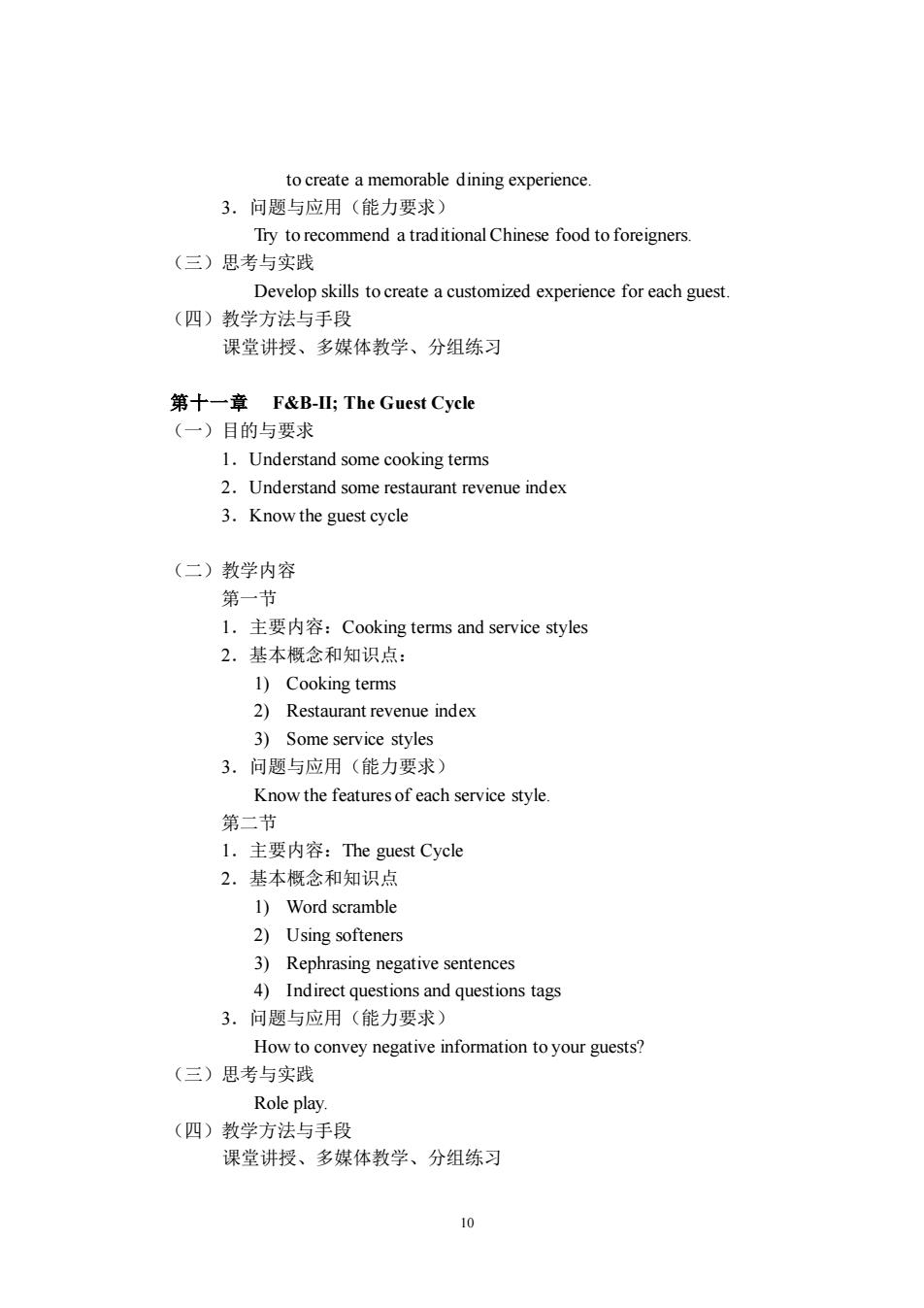
to create a memorable dining experience 3.问题与应用(能力要求 Try to recommend a traditional Chinese food to foreigners (三)思考与实践 Develop skills to create a customized experience for each guest. (四)教学方法与手段 课堂讲授、多媒体教学、分组练习 第十一章F&B-l;The Guest Cycle (一)目的与要求 1.Understand some cooking terms 2.Understand some restaurant revenue index 3.Know the guest cycle (二)教学内容 第一节 l.主要内容:Cooking terms and service style 2.基本概念和知识点: 1)Cooking terms 2)Restaurant revenue index 3)Some service styles 3.问题与应用(能力要求》 Know the features of each service style 第二节 .主要内容:The guest Cycle 2.基本概念和知识点 1)Word scramble 2)Using softeners 3)Rephrasing negative sentences 4)Indirect questions and questions tags 3.问题与应用(能力要求) How to convey negative information to your guests? (三)思考与实践 Role play (四)教学方法与手段 课堂讲授、多媒体教学、分组练习 10
10 to create a memorable dining experience. 3.问题与应用(能力要求) Try to recommend a traditional Chinese food to foreigners. (三)思考与实践 Develop skills to create a customized experience for each guest. (四)教学方法与手段 课堂讲授、多媒体教学、分组练习 第十一章 F&B-II; The Guest Cycle (一)目的与要求 1.Understand some cooking terms 2.Understand some restaurant revenue index 3.Know the guest cycle (二)教学内容 第一节 1.主要内容:Cooking terms and service styles 2.基本概念和知识点: 1) Cooking terms 2) Restaurant revenue index 3) Some service styles 3.问题与应用(能力要求) Know the features of each service style. 第二节 1.主要内容:The guest Cycle 2.基本概念和知识点 1) Word scramble 2) Using softeners 3) Rephrasing negative sentences 4) Indirect questions and questions tags 3.问题与应用(能力要求) How to convey negative information to your guests? (三)思考与实践 Role play. (四)教学方法与手段 课堂讲授、多媒体教学、分组练习